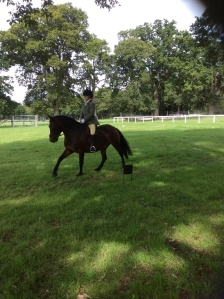Autism is a developmental disorder that can cause problems with social interaction, language skills, repetitive behaviour and physical movement (1). Although many interventions are being studied, at present there is no cure. But since reading ‘The Horse Boy’ by Rupert Isaacson I understand that sometimes a cure is not particularly wanted, but rather simply the ability that one day your child will be able to live happily and independently. What strikes me most in ‘The Horse Boy’ is not the seeking of a miraculous cure but the relationship that is created between Rowan (Isaacson’s son) and Betsy (his neighbour’s horse). Betsy was the alpha mare in her herd, she was known to have a fiery temper. However when Rowan ran into her field one day rolling and screaming beneath her hooves, she simply stood and dropped her head (a sign of equine submission). This bond was so great that Isaacson was able to start having a conversation with his son, whilst out riding, which he had previously struggled to do (2,3).
The biology behind ‘equine therapy’ is undetermined, but it may reduce the levels of the stress hormone cortisol. The gentle movement of the horse's gait may also release the hormone oxytocin (also known as the ‘love hormone’). The hormone has been said to help the brain to focus attention on another individual (4,5). This could prove extremely beneficial in the future treatment of autism because this engagement with the child can help break down social interaction barriers. With this the child could be taught useful skills needed for everyday life.
Unhappy with the schooling system for children on the spectrum Isaacson set about creating his own therapy centre; whereby both children and adults are able to learn important skills without being confined to a classroom. In my opinion I think this is an awe-inspiring idea. Many people with autism have difficulty starting conversations or taking part in them properly, but at this centre they are able to familiarise with their surroundings and often talk about the things around them that interest them, without feeling pressurised or stressed (6). A small pilot study has shown promising improvements for a child’s movement sensitivity, sensory and cognitive awareness (7). Further research is needed to confirm these findings, but the initial results seem promising. Enlightened by Isaacson’s methods, many people over the UK and USA have set up animal associated therapy centres; not just for the autistic but also for people suffering from depression and anxiety.
Jasmin Brooks
Christ the King College, Isle of Wight
My name is Jasmin Brooks and an interest in the health and welfare of animals has led me wanting to pursue a career in veterinary medicine. I am studying A-level biology, chemistry and mathematics and have an interest in the study of gene therapy and its long term effects on the development of medicine. I am also a keen horse rider and I enjoy competing with my pony in dressage; I am always interested in developments in the area of utilising animals to improve human health.
References
- http://www.autismresearchcentre.com/what_is_autism. Accessed 08/02/16.
- Rupert Isaacson: The Horse Boy: A Father's Miraculous Journey to Heal His Son. ISBN-13: 978-0141033631
- Rupert Isaacson: The Long Ride Home: The Extraordinary Journey of Healing that Changed a Child's Life. ISBN-13: 978-0670922284
- VanFleet R and Faa-Thompson T: THE CASE FOR USING ANIMAL ASSISTED PLAY THERAPY Bri. J. Play Therapy, Vol. 6 (2010), pp 4–18. Accessed through http://www.play-therapy.com/playfulpooch/images_resources/Case4AAPT.BJPTWinter10_4-18.pdf
- http://www.oregonlive.com/health/index.ssf/2014/04/working_with_horses_reduces_st.html. Accessed 06/02/16
- https://www.horseboyworld.com/horse-boy-method. Accessed 08/02/16.
- https://www.horseboyworld.com/research/horse-boy/horse-boy-research/273-horse-boy-camps-internal-research-report. Accessed 08/02/16.

